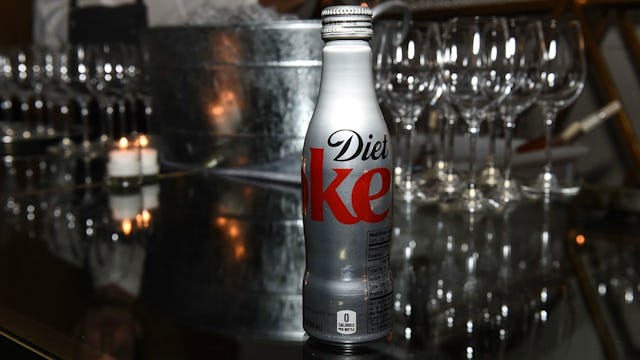Hi, My Name Is... And I'm A Diet Coke Addict

Hi. My name is Turney and I’m a Diet Coke addict. I have been for years. Countless times I’ve hopped in my car upon waking up, clad in my pajamas and not showered, and driven to the closest gas station to get my early morning fix. The craving for that diet soda high is just too much to bear. I need it. But once I hand over my $2 and have those 20 oz. in my sweet little hands—I know everything will be all right.
I can’t be alone. There must be others out there just like me. People who hear that Diet Coke talking to them. The faint whispers in the ear and the visions of dancing plastic bottles in the mind. But truth be told the diet soda addiction is just like crack—minus the dangers of imminent death, of course.
First there was Tab. That was like street-crack from the 1980s. And then Diet Coke was introduced to the United States in 1982. And in a few short years they started hustling that shit on every street corner in America. But it was good shit. You couldn’t go anywhere without seeing Diet Coke. And then slowly but surely, a dependency for it started to develop. Many years later they would come out with Coke Zero, which is the equivalent to suboxone for heroin users. It works in a pinch, but it’s not the real thing.
My Diet Coke addiction is a bitch. I can’t stop. And if you’re like me, you know you should. Here are the 5 stages of your addiction.
Stage 1
Planning Ahead—When the weatherman warns of an impending hurricane or blizzard and everyone races to the grocery store to get canned goods and water, you’re wondering if you have enough Diet Coke in the house. And no matter how much you have, you think I better stock up. In the history of drug addicts and alcoholics, nobody has ever showed up at a party and said, “Oh crap, I forgot the booze and drugs.” It’s never happened. So when you start to pre-plan your consumption, you know you’re in the early stages.
Morning drinker—The time of day no longer matters.
Excuses—Another early sign is taking a trip to the grocery store to mask your real motive, which is getting Diet Coke. Sure you’ll pick up a few other items, but there’s really only one reason you’re there. You’ll make up reasons or excuses to leave the house when your refrigerator is empty.
Stage 2
I’ll quit tomorrow—You have a plan. You know you need to cut down or control your consumption, but the best time to do that is tomorrow, not today. This is an early warning sign you’ve entered stage 2.
Obsession—If you don’t have any Diet Coke, all you can think about is getting some Diet Coke.
Stage 3
Doing it anyway—Despite knowing it’s causing physical and or mental health problems, you continue to drink it. It won’t happen to me. I’m not like the others, you think. These are the early warning signs of stage 3. This is treacherous territory. The addiction is about to go full-blown.
Secret stash—You have cans and/or bottles hidden in the usual spots. They’re just for you. And when guests come over, a Diet Coke is the last option you offer—if you offer it at all.
Stage 4
Lying about how much you drink—When the doctor or a family member asks you how much diet soda you drink in a day, you add up the number in your head and then subtract three. There’s no way you’re admitting to the real number.
Isolation—You used to only drink it socially, but now you prefer to be thirsty alone and with the shades drawn. You don’t want to share.
Stage 5
Psychologically and physically dependent—The quality of your day and mood depend on having enough Diet Coke. If you’re without your fix, you begin to have painful withdrawal symptoms. It’s hell.
Teeth—If your dentist arches both of his eyebrows when you open your mouth, then asks you if you have insurance, you know the end is near.
I usually live around Stage 3, but if I don’t do something soon about my malady then I know I’ll end up digging a deeper hole. And I know a thing or two about addiction and alcoholism. Recently I celebrated five years of sobriety from drugs and alcohol. It wasn’t easy. But I was able to recover from it one day at a time. There’s a well-known concept in the world of addiction called addiction swapping. It’s trading one addiction or compulsive behavior for another. That’s what I did, but I hope to kick this habit too.